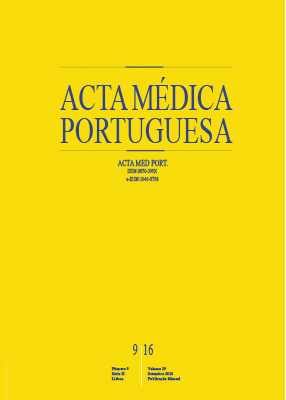Diabetes Knowledge Test Feasibility in Portugal
DOI:
https://doi.org/10.20344/amp.7517Keywords:
Diabetes Mellitus, Educational Measurement, Health Knowledge, Attitudes, Practice, Portugal, Psychometrics.Abstract
Introduction: Given the rising incidence of type 2 diabetes and taking into account that much of its control depends on the patient’s attitude towards his illness, loomed the need to equip health professionals with capable tools to determine the educational needs of their patients, allowing a more personalized intervention to correct habits that could be harmful to the diabetics’ health.
Objective: Verify the Diabetes Knowledge Test reliability in Portugal. Analysis of socio-demographic and pathologic variables’ correlation
with the number of correct answers in the test.
Material and Methods: Application of the translated version of Diabetes Knowledge Test to a convenience sample of a primary care center in Covilhã.
Results: In general, the questions obtained a Cronbach’s alpha > 0.800. Diabetics with better results in the survey proved to be more compliant, with a positive relationship between knowledge and diabetes’ control. However, only 9.2% of diabetics have good knowledge about their disease, and the majority (65.8%) shows an average one. The insulin treated patients show the worst results (77.6% with low knowledge). The variables ‘treatment route’ and ‘complications’ show statistical impact on the level of knowledge that diabetics have about their pathology (p values 0.00 and 0.048, respectively). Inhabitants of rural areas, without complications secondary to diabetes and treated orally, proved to be more compliant and to have better knowledge about the disease.
Discussion: Contrary to previous studies, variables such as age and educational level showed no relation with the performance in the survey. Inhabitants of the rural area and diabetics treated orally obtained better results than what had been previously advocated.
Conclusion: It has been proved the moderate to high psychometric reliability of the test, as its value establishing a correlation between
diabetes knowledge and control. It is expected that its future application will help identifying the reasons for uncontrolled diabetics, allowing a more individualized intervention by the health professionals.
Downloads
Downloads
Published
How to Cite
Issue
Section
License
All the articles published in the AMP are open access and comply with the requirements of funding agencies or academic institutions. The AMP is governed by the terms of the Creative Commons ‘Attribution – Non-Commercial Use - (CC-BY-NC)’ license, regarding the use by third parties.
It is the author’s responsibility to obtain approval for the reproduction of figures, tables, etc. from other publications.
Upon acceptance of an article for publication, the authors will be asked to complete the ICMJE “Copyright Liability and Copyright Sharing Statement “(http://www.actamedicaportuguesa.com/info/AMP-NormasPublicacao.pdf) and the “Declaration of Potential Conflicts of Interest” (http:// www.icmje.org/conflicts-of-interest). An e-mail will be sent to the corresponding author to acknowledge receipt of the manuscript.
After publication, the authors are authorised to make their articles available in repositories of their institutions of origin, as long as they always mention where they were published and according to the Creative Commons license.









